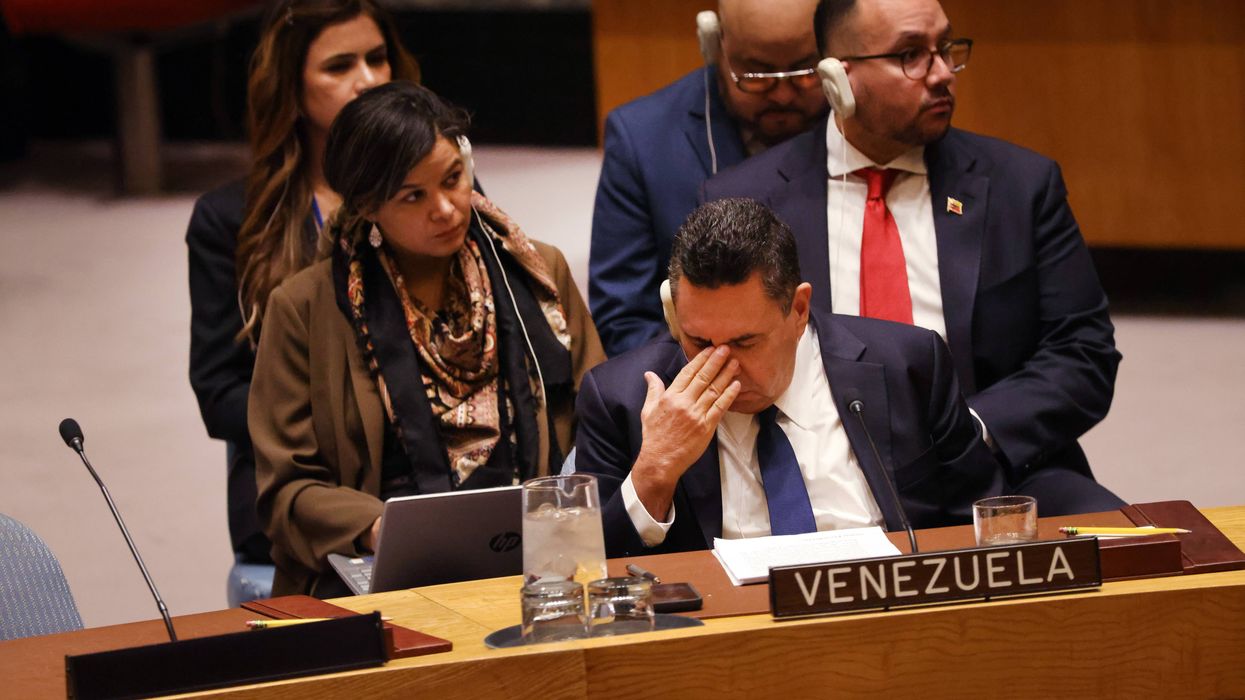April, 12 2012, 04:47pm EDT

Groups Appeal Arctic Oil Drilling Decision in Chukchi Sea
Lease Sale 193 approval flawed by missing science on impacts
Anchorage, AK
A coalition of groups filed an appeal today in the Ninth Circuit Court of Appeals challenging the approval of Lease Sale 193, which opened for oil drilling the remote Chukchi Sea, home to iconic species such as polar bear, bowhead whale, and walrus and to a vibrant indigenous subsistence culture.

The appeal, filed by Alaska Native and conservation groups, represented by Earthjustice, is the next step in their long-standing effort to ensure that decisions about the Chukchi Sea are based on sound science and precaution.
The lease sale was originally held in 2008 by the Bush administration. The Alaska Federal District Court in 2010 determined that the original lease sale violated the National Environmental Protection Act, one of the nation's bedrock environmental laws, and required the Department of Interior to reconsider the decision. Last fall, the Obama administration affirmed the decision to offer millions of acres of the ocean for sale to oil companies despite widely recognized gaps in what we know about nearly every species in the Chukchi Sea. Even though this critical missing information prevents adequate analysis of the effects of oil drilling in the Chukchi Sea, the administration concluded that none of it, including information about what areas are important to species such as bowhead whales, walrus, and beluga whales, is essential to the lease sale decision.
The groups filing the appeal are the Native Village of Point Hope, Inupiat Community of the Arctic Slope, Alaska Wilderness League, Center for Biological Diversity, Defenders of Wildlife, National Audubon Society, Natural Resources Defense Council, Northern Alaska Environmental Center, Oceana, Pacific Environment, Resisting Environmental Destruction on Indigenous Lands (REDOIL), Sierra Club, The Wilderness Society, and World Wildlife Fund.
The organizations issued the following statements regarding the appeal:
"The Obama administration's decision to affirm Chukchi Lease Sale 193 in America's Arctic Ocean was a clear case of politics trumping science. We are asking the courts to require the Obama administration to comply with the law," said Leah Donahey, Western Arctic and Oceans program director at Alaska Wilderness League. "Right now, Shell Oil's drill ships are on their way to the Chukchi Sea to begin the most aggressive course of Arctic drilling in history, despite the fact that we still know so little about the impacts this drilling could have on the Arctic's marine environment."
"This Bush-era lease sale in one of the most fragile and least understood ecosystems in the world was never a good idea," said Rebecca Noblin, Alaska director for the Center for Biological Diversity. "Four years later, all we've learned about the Chukchi Sea is how little we know. It's time the Obama administration took the blinders off and admitted that neither it nor the industry is prepared for the risks of drilling for oil in the Arctic Ocean."
"The Bush administration was wrong to open these fragile Arctic waters up to drilling without first having sufficient information about how those operations could impact the Arctic Ocean and the life it supports," said Sierra Weaver, senior attorney with Defenders of Wildlife. "And yet, even after BP's Deepwater Horizon oil disaster, the Obama administration made the same mistake. This failure to learn from the worst environmental catastrophe this country has ever seen is not only irresponsible, it's unacceptable."
"Today's appeal asks the court to require the Obama administration to comply with the law--and common sense--and look before it leaps into potentially catastrophic oil drilling in the Chukchi Sea. The administration must adequately assess missing basic scientific information about the region before deciding whether, where, and when to open it to drilling," said Erik Grafe, an attorney at Earthjustice, which represents the groups.
"The lease sale puts our way of life at risk. The Chukchi Sea is home to the animals we have relied on for thousands of years to sustain us. It is home to bowhead whales, walrus, seals, and salmon. It is irresponsible to open the ocean to oil and gas drilling, particularly when so much information about the effects of drilling is unknown and there is no way to clean up an oil spill in these waters," said George Edwardson, President of the Inupiat Community of the Arctic Slope.
"The rush to judgment here points up the folly of an indiscriminate 'all-of-the-above' approach to energy development that is not only misguided but will do more harm than good," said Charles Clusen, Alaska Project Director, Natural Resources Defense Council. "Even if commercial amounts of oil are found it will take a decade or more to get any of it to market. This oil at best can lower the price of gas by a few pennies far in the future while the oil companies will make huge profits. It's time to slow this down and get it right."
"Contrary to political mythology, rushing ahead with oil drilling in the Chukchi Sea will do absolutely nothing to lower the price of gasoline at the pump. And there is no demonstrated, or even remotely credible, ability to clean up a large oil spill in ice-laden water of the Arctic Ocean," said Eric Myers, Policy Director for Audubon Alaska.
"Americans deserve affordable energy and healthy oceans. Neither will be achieved by drilling in the Arctic Ocean," said Susan Murray, Senior Director, Pacific for Oceana. "Courts, communities, and this administration's own scientists have pointed to the need for baseline science to guide decisions about the Arctic Ocean. It is time we started listening to them and doing what is best for Arctic Ocean and those who depend on it, rather than what might be politically expedient or good for an oil company's bottom line."
"This lease poses serious risk to Arctic communities who rely on subsistence resources for their traditional and cultural survival," said Shawna Larson, Alaska Program Director for Pacific Environment. "There are huge knowledge gaps that remain on important areas for critical subsistence species, such as bowhead whales, and though a large blowout spill is possible, there are no means to respond or clean up a spill in the Arctic Ocean."
"There remain huge knowledge gaps in scientific understanding about life in the Arctic waters and the potential impacts of drilling. But we do know that the Arctic is home to some of the most amazing scenery and wildlife on the planet, and a critically important subsistence resource for the coastal Alaska Native people," said Dan Ritzman, Sierra Club Alaska Program Director. "We cannot afford to blindly entrust the future of one of our last wild frontiers, and the communities that rely on it for subsistence, to Big Oil. The Obama administration should not allow Shell to move forward with risky, dangerous plans to drill in this pristine area."
"It's unfortunate that we must litigate against the federal government to prevent premature drilling in the Arctic's Chukchi Sea," said Lois Epstein, The Wilderness Society's Engineer and Arctic Program Director. "If the administration truly believes in science-based decision-making, it would address the key science gaps identified by the U.S. Geological Survey in the Chukchi Sea before authorizing drilling."
"The risks and potential impacts associated with Arctic offshore oil development plans are unacceptably high at this stage because the industry has not adequately addressed the lessons of the Deepwater Horizon disaster," said WWF's Arctic Program's Layla Hughes, Senior Program Officer for Oil, Gas and Marine Shipping. "Given this, and particularly in light of the difficult working conditions and lack of infrastructure found in the Arctic, it would be irresponsible to begin drilling."
Contact:
Erik Grafe, Earthjustice, (907) 792-7102
Emilie Surrusco, Alaska Wilderness League, (202) 544-5205
Rebecca Noblin, Center for Biological Diversity, (907) 274-1110
Caitlin Leutweiler, Defenders of Wildlife, (202) 772-3226
George Edwardson, Inupiat Community of the Arctic Slope, (907) 444-7240
Eric Myers, Audubon Alaska, (907) 276-7034
Bob Keefe, NRDC, (202) 289-2373
Will Race, Oceana, (907) 586-4944
Shawna Larson, Pacific Environment, (907) 841-5163
Virginia Cramer, Sierra Club, (804) 225-9113, ext. 102
Lois Epstein, The Wilderness Society, (907) 272-9453, ext. 107
Matt Farrauto, World Wildlife Fund, (202) 495-4593
Erik Grafe, Earthjustice, (907) 792-7102
Emilie Surrusco, Alaska Wilderness League, (202) 544-5205
Rebecca Noblin, Center for Biological Diversity, (907) 274-1110
Caitlin Leutweiler, Defenders of Wildlife, (202) 772-3226
George Edwardson, Inupiat Community of the Arctic Slope, (907) 444-7240
Eric Myers, Audubon Alaska, (907) 276-7034
Bob Keefe, NRDC, (202) 289-2373
Will Race, Oceana, (907) 586-4944
Shawna Larson, Pacific Environment, (907) 841-5163
Virginia Cramer, Sierra Club, (804) 225-9113, ext. 102
Lois Epstein, The Wilderness Society, (907) 272-9453, ext. 107
Matt Farrauto, World Wildlife Fund, (202) 495-4593
Earthjustice is a non-profit public interest law firm dedicated to protecting the magnificent places, natural resources, and wildlife of this earth, and to defending the right of all people to a healthy environment. We bring about far-reaching change by enforcing and strengthening environmental laws on behalf of hundreds of organizations, coalitions and communities.
800-584-6460LATEST NEWS
Trump Blockade of Venezuela, Murders on High Seas Violate International Law: UN Experts
"The illegal use of force, and threats to use further force at sea and on land, gravely endanger the human right to life and other rights in Venezuela and the region."
Dec 24, 2025
Experts at the United Nations on Wednesday issued a scathing rebuke to US President Donald Trump's aggression toward Venezuela, saying attempts to impose an oil blockade based on US-imposed sanctions and a series of bombings of alleged drug-trafficking vessels at sea are clear violations of international law.
“There is no right to enforce unilateral sanctions through an armed blockade,” said the UN experts.
According to their statement:
A blockade is a prohibited use of military force against another country under article 2(4) of the UN Charter. “It is such a serious use of force that it is also expressly recognized as illegal armed aggression under the General Assembly’s 1974 Definition of Aggression,” the experts said.
“As such, it is an armed attack under article 51 of the Charter – in principle giving the victim State a right of self-defence,” they said.
“The illegal use of force, and threats to use further force at sea and on land, gravely endanger the human right to life and other rights in Venezuela and the region,” the experts said.
Aggression is a crime attracting universal jurisdiction under international law, which gives all countries the power to prosecute it, although the most senior government leaders retain immunity from foreign prosecution while still in office.
The experts behind the joint statement were: Ben Saul, Special Rapporteur on the promotion and protection of human rights and fundamental freedoms while countering terrorism; George Katrougalos, Independent Expert on the promotion of a democratic and equitable international order; Surya Deva, Special Rapporteur on the right to development; and Gina Romero, Special Rapporteur on the rights to freedom of peaceful assembly and of association.
Their statement notes that the US sanctions imposed on Venezuela may be "unlawful" because they are "disproportionate and punitive" under international statute. It is alleged that violations of these sanctions that the Trump administration has used to justify the blockade.
"The threat is not Venezuela. The threat is the US government." —Venezuela UN Ambassador Samuel Moncada
The aggression of the US government toward Venezuela was also rebuked at an emergency meeting of the UN Security Council on Tuesday, with China, Russia, Cuba, Colombia, and others backing Venezuela's call for an end to the series of criminal boat bombings against alleged drug traffickers in the Caribbean and eastern Pacific and the unlawful seizure of oil tankers as a way to coerce the government of President Nicolas Maduro.
Venezuela's UN Ambassador Samuel Moncada equated Trump's Dec. 16 order that the US was establishing a "total and complete blockade of all sanctioned oil tankers" coming into or out of Venezuela an admission of "a crime of aggression" by the US president, who Moncada said wants to “turn back the clock of history 200 years to establish a colony" in the Latin American country.
Moncada characterized the recent US seizure of two oil tankers in international waters as "worse than piracy" and "robbery carried out by military force," warning that such brazen acts set "an extremely serious precedent for the security and navigation of international trade" in the region and worldwide.
"We are in the presence of a power that acts outside of international law," he said of the US delegation, "demanding that Venezuelans vacate our country and hand it over. We are talking about pillaging, looting, and recolonization of Venezuela."
During his comments to the council, Mike Waltz, the US Representative to the UN, defended Trump's policies by calling the threat of "transnational terrorist and criminal groups" the "single most serious threat" in the hemisphere. Waltz repeatedly claimed, without providing evidence, that Maduro's government is part of a criminal gang called "Cartel de Los Soles," which Moncada said was "ridiculous" as the group is "non-existent," an invention of the Trump administration.
Human rights groups, UN experts, and scholars of international have all stated that Trump's extrajudicial targeting of alleged drug boats—which have now left over 100 people killed—are nothing short of "murder" on the high seas.
In their Wednesday statement, the four UN experts said the killings at sea ordered by Trump "amount to violations of the right to life," citing the International Covenant on Civil and Political Rights, which the US government ratified in 1992.
The experts called on all UN member states "to urgently take all feasible measures to stop the blockade and illegal killings" by the US government, "including through diplomatic protest, General Assembly resolutions, and peaceful counter-measures—and bring perpetrators justice."
“Collective action by States is essential to uphold international law,” they said. “Respect for the rule of law, sovereignty, non-use of force, non-intervention, and the peaceful settlement of disputes are essential to preserving peace and stability worldwide.”
In his remarks, Moncada said Venezuela would defend itself against aggression but did not consider itself at war with the United States.
"Let it be clear once and for all that there is no war in the Caribbean, there is no international armed conflict, nor is there a non-international one, which is why it is absurd for the US government to seek to justify its actions by applying the rules of war," Moncada told the council.
"The threat is not Venezuela," he said. "The threat is the US government."
Keep ReadingShow Less
YouTube, TikTok Deleted ‘60 Minutes’ CECOT Clips Amid Paramount Takedown Push
The segment on the notorious torture prison—where the Trump administration has been unlawfully deporting Venezuelans—went viral on social media after being inadvertently aired in Canada.
Dec 23, 2025
Websites including YouTube and TikTok this week removed posts of a CBS News "60 Minutes" segment on a notorious prison in El Salvador, where Trump the administration has been illegally deporting Venezuelan immigrants, after being notified that publishing the clip violated parent company's copyright.
The segment on the Terrorism Confinement Center (CECOT)—which was intended to air on Sunday's episode of "60 Minutes"—was pulled by right-wing CBS News editor-in-chief Bari Weiss, who claimed that the story "was not ready" for broadcast, despite thorough editing and clearance by key company officials.
“Our story was screened five times and cleared by both CBS attorneys and Standards and Practices," said "60 Minutes" correspondent Sharyn Alfonsi, who reported the segment. “It is factually correct. In my view, pulling it now, after every rigorous internal check has been met, is not an editorial decision, it is a political one.”
The segment—which can still be viewed on sites including X—was shared by social media users after a Canadian network received and broadcast an original version of the "60 Minutes" episode containing the CECOT piece prior to CBS pulling the story. The social media posts containing the segment were reportedly removed after CBS parent company Paramount Skydance filed copyright claims.
A CBS News representative said that “Paramount’s content protection team is in the process of routine take down orders for the unaired and unauthorized segment.”
Weiss—who also founded and still edits the Paramount Skydance-owned Free Press—has faced criticism for other moves, including presiding over the removal of parts of a previous "60 Minutes" interview with President Donald Trump regarding potential corruption stemming from his family’s massive cryptocurrency profits.
On Tuesday, Axios reported that Weiss is planning a broad overhaul of standards and procedures at the network, where she was hired by Paramount Skydance CEO and Trump supporter David Ellison in October, despite a lack of broadcasting experience.
Keep ReadingShow Less
Israeli Defense Minister Tries to Walk Back Vow to 'Never Leave Gaza,' Build Settlements
The remarks drew critical responses, including from other Israelis and the White House.
Dec 23, 2025
Israeli Defense Minister Israel Katz "said the silent part out loud" on Tuesday, then promptly tried to walk back his comments that his country would not only never leave the Gaza Strip, but also reestablish settlements in the decimated exclave.
Israel evacuated Jewish settlements in Gaza two decades ago, but some officials have pushed for ethnically cleansing the strip of Palestinians and recolonizing it, particularly since the Hamas-led October 7, 2023 attack and the devastating Israeli assault that followed.
The Times of Israel on Tuesday translated Katz's remarks—made during an event about expanding Beit El, a Jewish settlement in the illegally occupied West Bank—from Hebrew to English:
"With God's help, when the time comes, also in northern Gaza, we will establish Nahal pioneer groups in place of the settlements that were evacuated," he said. "We'll do it in the right way, at the appropriate time."
Katz was referring to the Nahal military unit that, in part, lets youths combine pioneering activities with military service. In the past, many of the outposts established by the unit went on to evolve into full-fledged settlements.
"We are deep inside Gaza, and we will never leave Gaza—there will be no such thing," Katz said. "We are here to defend and to prevent what happened from happening again."
The so-called peace plan for Gaza that US President Donald Trump and Israeli Prime Minister Benjamin Netanyahu announced at the White House in late September notably states that "Israel will not occupy or annex Gaza," and "the Israel Defense Forces (IDF) will withdraw based on standards, milestones, and timeframes linked to demilitarization."
Gadi Eisenkot, a former IDF chief of staff who launched a new political party a few months ago, responded to Katz on social media, writing in Hebrew, "While the government votes with one hand in favor of the Trump plan, it sells myths with the other hand about isolated settlement nuclei in the strip."
"Instead of strengthening security and bringing about an enlistment law that will bolster the IDF, the government, driven by narrow political considerations, continues to scatter irresponsible and empty declarations that only harm Israel's standing in the world," he added.
The White House was also critical of Katz's comments, with an unnamed official saying that "the more Israel provokes, the less the Arab countries want to work with them."
"The United States remains fully committed to President Trump's 20-point peace plan, which was agreed to by all parties and endorsed by the international community," the official continued. "The plan envisions a phased approach to security, governance, and reconstruction in Gaza. We expect all parties to adhere to the commitments they made under the 20-point plan."
Later Tuesday, Katz's office said that "the minister of defense's remarks regarding the integration of Nahal units in the northern Gaza Strip were made solely in a security context. The government has no intention of establishing settlements in the Gaza Strip. The minister of defense emphasized the central principle of border defense in every arena: The IDF is the first and last line of defense for Israel's citizens, and the state of Israel relies for its protection solely on it and on the security forces."
Katz became defense minister in November 2024, just weeks before the International Criminal Court issued arrest warrants for his fired predecessor, Yoav Gallat, and Netanyahu over Israel's assault on and blockade of Gaza. When Katz took on the new role after serving as foreign minister, Palestine defenders accused the prime minister of swapping one "genocidal lunatic" for another.
Israel faces an ongoing genocide case at the International Court of Justice for its mass slaughter of Palestinians in Gaza. As of Tuesday, local officials put the death toll since October 2023 at 70,942, with another 171,195 Palestinians wounded, though global experts warn the true tallies are likely far higher.
At least 406 of those confirmed deaths have occurred since Israel and Hamas agreed to a ceasefire that took effect October 10. In a Monday letter demanding action from the White House, dozens of Democratic US lawmakers noted Israel's "continued bombardment against civilians, destruction of property, and insufficient delivery of humanitarian aid."
Keep ReadingShow Less
Most Popular


